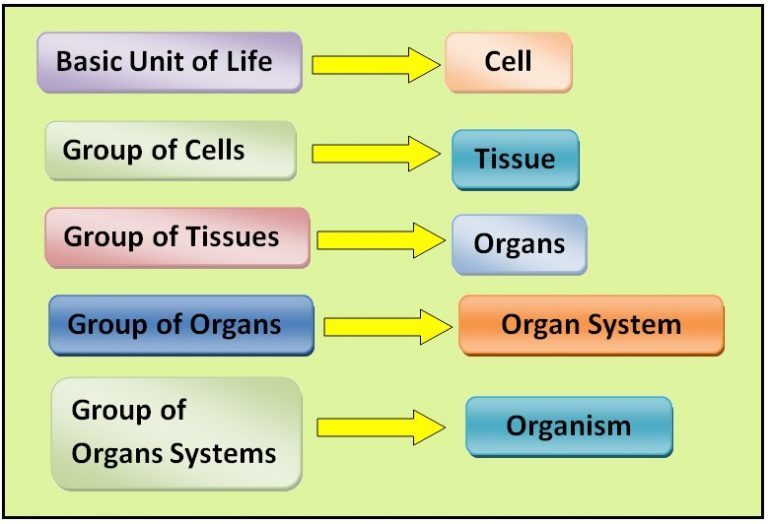Organs in Multi-cellular Organisms
Grade 7 Science Worksheets
What is the order of the levels of organization in a multicellular organism?

All multi cellular organisms like large animals and human beings have various organ systems that work together, carrying out activities that keep us alive.
The body has various smaller units that build and work together. For any living being to live, eat and develop themselves all organs of the body must function properly for example the digestive, nervous systems, circulatory system.
The timely activity of all the organs helps all the systems to function efficiently. For example, circulatory system circulates blood. If it didn’t transport blood on time. It affects the entire body.
Schedule a Free session to clear worksheet doubts
No credit card required, no obligation to purchase.
Just schedule a FREE Sessions to meet a tutor and get help on any topic you want!
Multi and unicellular beings and their organ systems
Why are there different types of cells in the body of multi-cellular organisms?
Human beings are multi cellular organisms. We have complex bodies and have more than 30 trillion cells; these cells are not in direct contact with the outer environment. These cells are incapable of absorbing nourishment’s directly from the environment.
Unlike single–celled organisms like euglena, amoeba which has a tendency to breed in a place rich in nutrition. It directly and easily absorbs nutrients from the environment. It gets its oxygen to perform body functions that also gets easily absorbed or diffused into its cell through its cell membrane, and also carbon dioxide and other wastes gets out in the same way. For reproduction, it easily just divides itself in two.
A Picture of an amoeba

Such easy processes does not happen with the cells present in large multi cellular organisms but they get their nutrition from a source which is an enclosed fluid called extracellular fluid a fluid found just outside of cells. The cells receive oxygen and nutrients from this fluid and release waste products into it.
All organ systems carry out their assigned functions. For example, our respiratory system along with our circulatory system helps to take in oxygen and lets out carbon dioxide; our digestive system digests and processes food. The skeletal system makes our movement possible; the endocrine system secretes hormones; and the excretory system gets rid of food waste.
Organs of the human body
Cardiovascular System
It helps maintain body temperature and pH levels meaning potential of hydrogen, this helps to control acid levels and alkalinity in our body. Cardiovascular system also transports oxygen and nutrients, to the cells and removes wastes and CO2 from the same.
Organ tissues that are involved are: heart blood and blood vessels.


Digestive System
Its main function is to digest food and absorb the nutrients, minerals, vitamins, carbohydrates, protein and water from the food taken in.
Organ tissues that aid are: Mouth, salivary gland, food pipe or esophagus, stomach, liver, pancreas, gall bladder, small intestine, large intestine.
Helps to defend against dangerous infection and diseases and transfers lymph between tissues and the blood vessels.
Organ Tissues that aid are: Lymph nodes, and lymph vessels
Endocrine System
The Endocrine System develops a communication process within the body with the help hormones and makes long-term change in other organ systems.
Tissue systems that connect are: Pituitary gland, thyroid, parathyroid, adrenals, testes, and ovaries.
Muscular system
Muscular system helps us to move around, support, flexibility and mobility of the body.
Tissues involved: smooth muscles and skeletal muscles.

Nervous System
The nervous system mainly picks up required data and transfers that for information processing. It then sends and receives the data from the central nervous system (brain).
Organs involved are: brain, sensory nerves, spinal cord.
Reproductive System
Produces gametes and sex cells, embryo to produce offspring or young ones
Organs involved: male body has prostate, and penis. Female body has ovaries, uterus.
Respiratory system
It is a set of organs and tissue systems which help to take in air rich in oxygen and exhaling air rich in carbon dioxide.
Organs involved: Mouth, nose, larynx, pharynx, lungs, bronchi
Skeletal System
It protects soft underlying tissues of the body, provides for flexibility and movement to the joints. It produces cells carrying blood, and stores the nutrients.
Organs involved: Joint muscles, cartilage, tendon, and ligament.
Urinary System
This system removes excess water and salts, natural acids and controls the ph level (potential of hydrogen) of the body.
Organs: Kidneys, urethra, urinary bladder, ureters.
Immune System
The immune system fights against micro pathogens and basically the disease-causing antibodies and other diseases.
Tissue systems which work here are leukocytes, thymus, spleen, tonsils, also other skin tissues.
Learn more about Organs in Multi-Cellular Organisms and other important topics with 7th Grade Science Tutoring at eTutorWorld. Our expert science tutors break down the topics through interactive one-to-one sessions. We also offer the advantage of customized lesson plans, flexible schedules and convenience of learning from home.
eTutorWorld Understands Math Tutoring | Online Math Worksheets are Important Tools
Understanding graphs, charts, and opinion polls in a newspaper, for calculating house and car payments, and for choosing a long-distance telephone service are impossible without strong math skills …and the only way to develop strong math skills is by constant practice.
‘Practice makes a man perfect’ holds true for no other field better than for math. A middle or high school student must set aside a minimum of an hour for math every day. Other than textbooks, worksheets help you revise and understand concepts better.
Our expert tutors prepare online maths worksheets that are age and grade-appropriate. Grade-wise math worksheets for Elementary Math, Arithmetic, Pre-Algebra, Algebra, Geometry, Trigonometry, Statistics, Pre-Calculus and Calculus can be solved to improve math skills, to get ahead or to even catch up.
You may download these FREE online math worksheets in the PDF format, and then print and email us their solutions for a free evaluation and analysis by eTutorworld’smath expert tutors.
You may solve these worksheets by yourself or with your peers while studying together.
The Answer Key at the end of each worksheet allows for a self-evaluation.
Personalized Online Tutoring
eTutorWorld offers affordable one-on-one live tutoring over the web for Grades K-12, Test Prep help for Standardized tests like SCAT, CogAT, MAP, SSAT, SAT, ACT, ISEE and AP. You may schedule online tutoring lessons at your personal scheduled times, all with a Money-Back Guarantee. The first one-on-one online tutoring lesson is always FREE, no purchase obligation, no credit card required.
For answers/solutions to any question or to learn concepts, take a FREE CLASS.
No credit card required, no obligation to purchase.
Just book a free class to meet a tutor and get help on any topic you want!
Check Point
I. Describe the functions of the following:
- Immune system
- Nervous system
- Lymphatic system
- Endocrine system
- Cardiovascular system
Answer Key
I. Describe the functions of the following –
- Immune System: Fights against micro pathogens, disease-causing antibodies and other diseases.
- Nervous System: The nervous system mainly picks up required data and transfers that for information processing. It then sends and receives the data from the central nervous system (brain).
- Lymphatic System: Helps to defend against dangerous infection and diseases and transfers lymph between tissues and the blood vessels.
- Endocrine System: Develops a communication process within the body with the help hormones and makes long-term change in other organ systems.
- Cardiovascular System: It helps maintain body temperature and pH levels that is acid levels in our body. This means potential of hydrogen. It also transports oxygen and nutrients, to the cells and removes wastes and CO2 from the same.
Pricing for Online Tutoring
| Tutoring Package | Validity | Grade (1-12), College |
|---|---|---|
| 5 sessions | 1 Month | $139 |
| 1 session | 1 Month | $28 |
| 10 sessions | 3 months | $269 |
| 15 sessions | 3 months | $399 |
| 20 sessions | 4 months | $499 |
| 50 sessions | 6 months | $1189 |
| 100 sessions | 12 months | $2249 |
IN THE NEWS

Our mission is to provide high quality online tutoring services, using state of the art Internet technology, to school students worldwide.
Online test prep and practice
SCAT
SSAT
ISEE
PSAT
SAT
ACT
AP Exam
Science Tutoring
Physics Tutoring
Chemistry Tutoring
Biology Tutoring
Math Tutoring
Pre-Algebra Tutoring
Algebra Tutoring
Pre Calculus Tutoring
Calculus Tutoring
Geometry Tutoring
Trigonometry Tutoring
Statistics Tutoring
Quick links
Free Worksheets
Fact sheet
Sales Partner Opportunities
Parents
Passive Fundraising
Virtual Fundraising
Our Expert Tutors
Safe and Secure Tutoring
Interactive Online Tutoring
After School Tutoring
Elementary School Tutoring
Middle School Tutoring
High School Tutoring
Home Work Help
Math Tutors New York City
Press
©2022 eTutorWorld Terms of use Privacy Policy Site by Little Red Bird
©2022 eTutorWorld
Terms of use
Privacy Policy
Site by Little Red Bird






